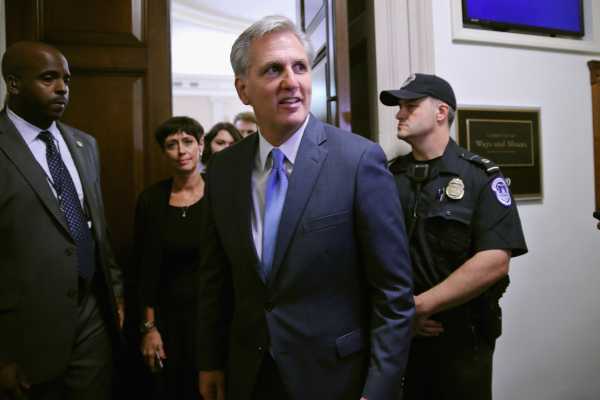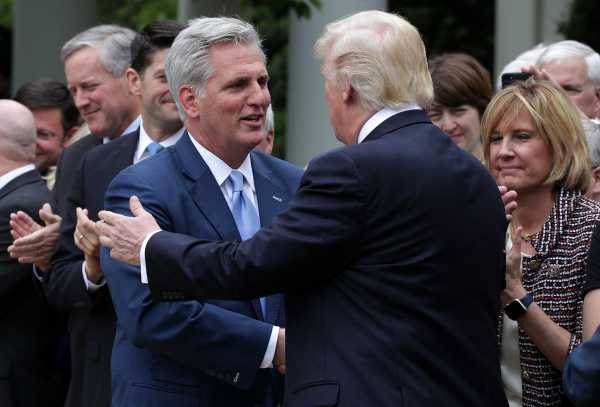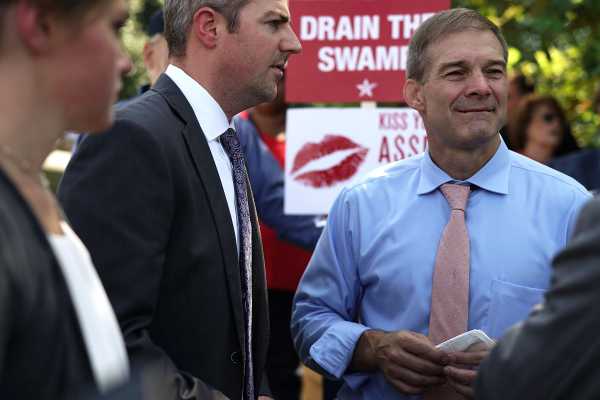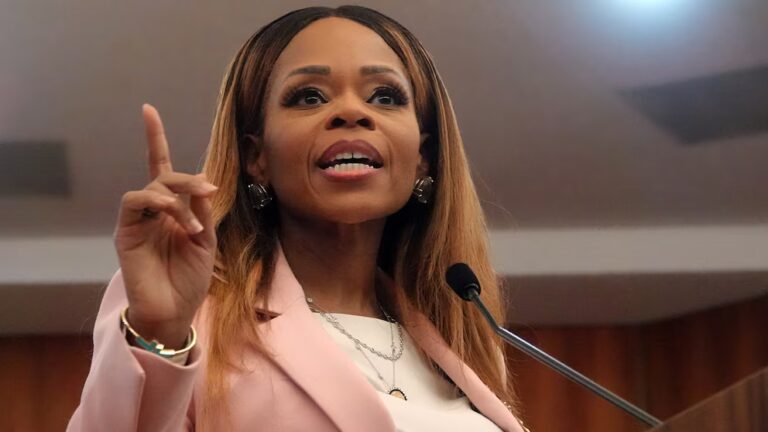
House Republicans are scrambling to find their Nancy Pelosi.
Soon to be in the minority, Republicans are currently leaderless. House Speaker Paul Ryan announced his retirement in April, and Republicans are in search of a minority leader — the position Pelosi currently holds.
Majority Leader Rep. Kevin McCarthy (R-CA) announced his bid to fill the spot shortly after Ryan’s announcement, but one other figure — Rep. Jim Jordan (R-OH), the founding member of the conservative Freedom Caucus — has made it clear he would like the job. Unlike the speaker, which is voted on by the entire House body, the minority leader will be elected by the party conference in January.
The two lawmakers represent a split in the Republican Party. While both are ardent defenders of President Donald Trump, McCarthy, as the number two House Republican is the natural successor to Ryan. Jordan is the outsider — a conservative ideologue, who only three years ago stood in the way of McCarthy becoming House speaker.
Jordan’s pitch is that he’s anti-establishment.
“The president was elected in 2016 to come here and change this place,” Jordan said, continuing to slam the current leadership. “I don’t think Congress has shown the same kind of intensity to reform and change the way this town does business.”
With Democrats in control of the House, Republicans have a choice: They will either have to find middle ground with their colleagues across the aisle or accept that nothing will happen until they regain the majority. It comes down to who wins this leadership race.
Kevin McCarthy is the natural successor to the minority leader position — but that might be his downfall

McCarthy, the current No. 2 House Republican, is an established name in Washington.
He’s held a seat in the House since 2007. Before that, he served as the minority leader of the California State Assembly — a position he was elected to as a freshman state lawmaker. His ambitions to lead House Republicans has been clear since 2015, when he ran to replace the embattled retiring Speaker John Boehner. But his campaign was short-lived; rumors of an affair with a colleague, overtly bragging about how Benghazi investigations tanked Hillary Clinton’s poll numbers, and an archconservative revolt from the House Freedom Caucus pushed McCarthy to step behind Paul Ryan instead.
At the time a cohort of conservatives, then led by Jordan, found McCarthy too close to Republican leadership and didn’t trust him to include the hardline Republicans in the party’s legislative process.
But the factors that once deemed McCarthy’s leadership dreams untenable have largely washed away. He’s both close to leadership as the Majority Leader and a friend of Trump’s, who reportedly calls him “my Kevin,” an alliance that will make it harder (although not impossible) for Trump-loving House conservatives to break ranks with him.
Unlike Ryan, McCarthy is not someone known to lead a policy debate, but on Capitol Hill, he’s well-liked and persuasive. He’s a strong fundraiser, and as someone who always said Republicans would stay in control of the House in 2019, he managed to convince his fellow Republicans that sticking with the party’s agenda was a winning strategy — to his own undoing, ironically.
As Democrats across the country campaigned on the failures of the Republican agenda to flip the House, there’s a serious question as to whether Republicans in the House will want more of the same.
“If House Republicans pick McCarthy to be minority leader in the 116th Congress, they are essentially saying the fault for their minority status lies elsewhere; that they are not responsible,” James Wallner, a political scientist with the conservative think tank R Street, tweeted. “Otherwise, why continue with current leadership?”
Jim Jordan wants to make the party more hardline

If you ask Jordan, Republicans’ downfall was that they weren’t conservative enough.
”Have we replaced ObamaCare yet? Have we secured the border yet? Have we reformed welfare yet? No we haven’t,” Jordan told the Hill.
One of the founders of the House Freedom Caucus, depending on who you ask, Jordan is either a conservative star or a pain in Republicans’ side. His caucus has repeatedly stood in the way of legislation, from health care to immigration, for not being conservative enough.
A five-term Congress member from Ohio, Jordan’s mission in the House has been to push the Republican Party further to the right — whether on social policy around LGBTQ rights or reproductive rights, or on economic policy. A former champion wrestler, Jordan came under scrutiny earlier this year after former Ohio State University wrestlers alleged he ignored the sexual abuse of athletes and students by a former team doctor during his tenure as the assistant coach of Ohio State’s wrestling team from 1986 to 1994.
The scandal, which has largely faded in the news cycle, didn’t change Jordan’s leadership ambitions.
He’s not shy about theatrics. One of the House’s most vocal FBI and Justice Department skeptics, Jordan is the kind of Republican who still wants to talk about investigating Hillary Clinton and loves to echo Trump in calling the Russia investigation a “witch hunt.” He’s been on the forefront of the conservative fight to oust Deputy Attorney General Rod Rosenstein.
And in some ways, Jordan is more interested in the fight than getting the actual policy done.
This is how he sees the role of the minority leader job: “Now that we’re in the minority, that’s about all we can do is debate, but fight hard in the debate for the principles, for the things that we know the American people sent us here to do in 2016. Show them that we deserve to be back in power in 2020,” Jordan said.
Sourse: vox.com






